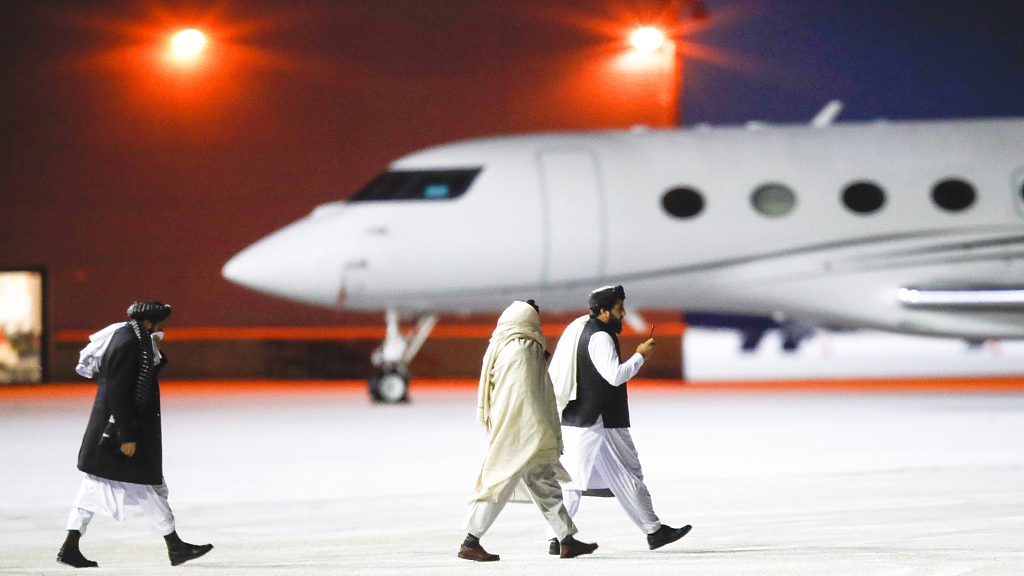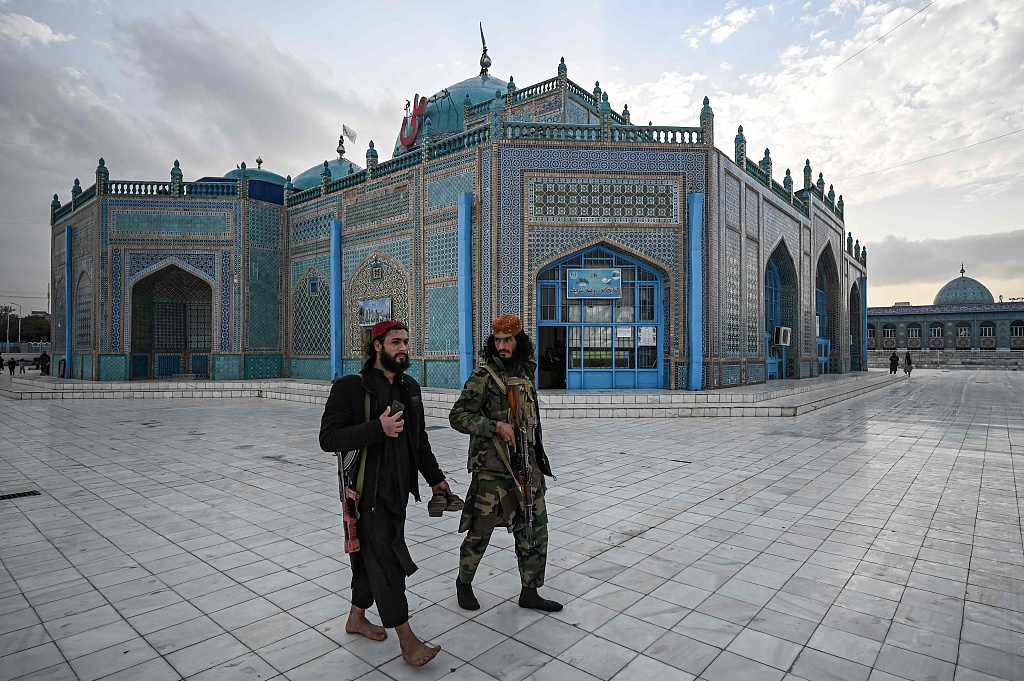
Representatives of the Taliban leave Gardermoen Airport after attending meetings at the Soria Moria Hotel in Oslo, Norway, January 25, 2022. /CFP
Representatives of the Taliban leave Gardermoen Airport after attending meetings at the Soria Moria Hotel in Oslo, Norway, January 25, 2022. /CFP
Editor's Note: Freddie Reidy is a freelance writer based in London. He studied history and history of art at the University of Kent, Canterbury, specializing in Russian history and international politics. The article reflects the author's opinions and not necessarily the views of CGTN.
While a return to Taliban rule seemed a more than possible scenario as U.S.-led coalition forces prepared to leave Afghanistan in 2021, no one expected the Taliban to make such a rapid return to power. Since such a rapid withdrawal was met with the Taliban's rapid advance, a power vacuum was prevented. What have been the consequences for wider regional stability though?
Philosopher George Santayana is well known for his observation that "those who cannot remember the past are condemned to repeat it." Nowhere is that truer perhaps than Afghanistan where the three superpowers of the 20th and early 21st century entered and withdrew having lost thousands of troops.
Time and again nations and governments have underestimated the bonds of tribal identity and regional heritage when trying to formulate the notion of a nation state. The concept of a nation is of course vital to Afghanistan's neighbors, as nations are intrinsically bound by their borders.
However, the return to power of the Taliban was no guarantee of a return to order for Afghanistan or its neighbors, although concerns over a protracted civil war were also not realized.
While many neighbors had feared a rise in jihadist activity on their borders, it was actually the forces of former Afghan President Ashraf Ghani's government which were among the first to cross the border. In Uzbekistan, 22 Afghan air force fighters fled the country seeking permission to land in August 2021 alongside 24 helicopters and over 500 personnel – symptomatic of the rapid collapse of order and fear among many Afghans.
Ghani has since stated that the precipitous demise of government control was a result of coalition withdrawal. Ghani told the BBC, "What they (Afghans) rightly blame me for, they have a total right to, I trusted in our international partnership and pursued that path… All of us made a huge mistake assuming the patience of the international community would last."

Taliban fighters walk through the compound of the Hazrat-e-Ali shrine or Blue Mosque in Mazar-i-Sharif, December 23, 2021. /CFP
Taliban fighters walk through the compound of the Hazrat-e-Ali shrine or Blue Mosque in Mazar-i-Sharif, December 23, 2021. /CFP
While coalition troops withdrew, the regional difficulties remained alongside the threat of overspill. One particular flashpoint is the Durand Line on the Afghan-Pakistani border where recent skirmishes have prompted the Pakistani military to erect a hard border of steel and barbed wire – a move branded by Afghanistan's defense minister as "illegal" and which they "have no right" to make.
The border is of particular controversy since it was demarcated by the British Empire in 1893. The area is home to a significant number of the Tehrik-e-Taliban Pakistan (TTP) members who were instrumental supporters of the Afghan Taliban from 2001 onward.
Increased tension within Pakistan led to Pakistani Interior Minister Sheikh Rashid Ahmed warning that "we have received a kind of signal that terrorist incidents have started happening in Islamabad," as a police officer was murdered by the TTP last week. However, the tripartite relationship is complex and part of a wider powerplay. The Afghan Taliban had actually led a ceasefire between the TPP and Pakistani forces.
Furthermore, the belief that the fluid situation in Afghanistan has caused regional unrest beyond expectations is perhaps overplayed. Unrest in Kazakhstan, for example, has far stronger roots in micro domestic issues than macro regional concerns. However, the threat of agents willing to pour fuel on fire remains.
The fact remains though that a transition in leadership does not bring about an end to conflicts; it would be the folly Santayana warned of to believe such a thing.
Illustrating the Machiavellian power dynamics and cold realities, Afghan commentator Shafi Atal said, "The leadership of the Taliban would possibly accept the line as a border in front of the Pakistani establishment, but they are afraid of the reaction of the Afghan population as well as lower ranks." Indeed there is a belief that "the drama by the Taliban (over the border dispute) is to show the Afghans that they are not linked with the Pakistani establishment."
While troubling reports continue to come out of Afghanistan, the Taliban remain engaged diplomatically. Talks this week concluded between the U.S. and European powers over the humanitarian crisis in Afghanistan and the prospect of a restoration of aid were said to be optimistic.
Jamila Afghani, an Afghan women's rights activist, characterized the Oslo summit to the AFP news agency as a "positive icebreaking meeting… (The Taliban) displayed goodwill … Let's see what their actions will be, based on their words."
While skeptics view a Taliban Damascene conversion as highly improbable, optimists will appreciate that civil war has been avoided, regional stability is broadly intact and that the Taliban remain engaged in talks. Realists though will be acutely aware of the tightrope that must be walked when leading a nation whose very existence a sizeable percent of the population question.
(If you want to contribute and have specific expertise, please contact us at opinions@cgtn.com.)

